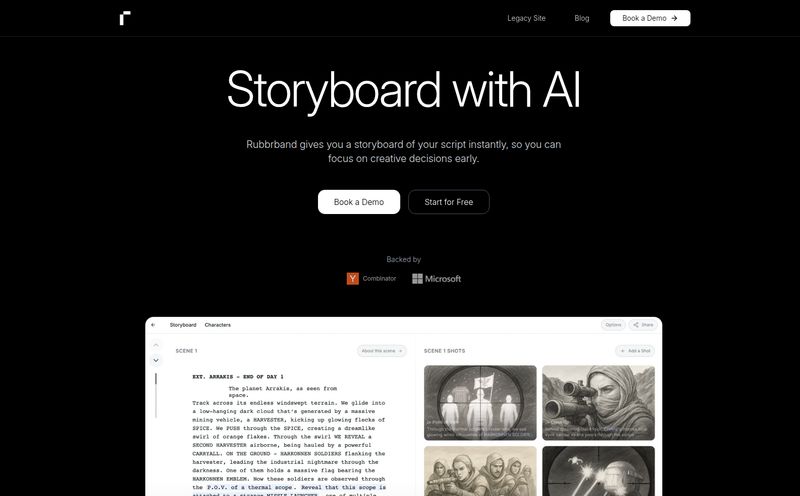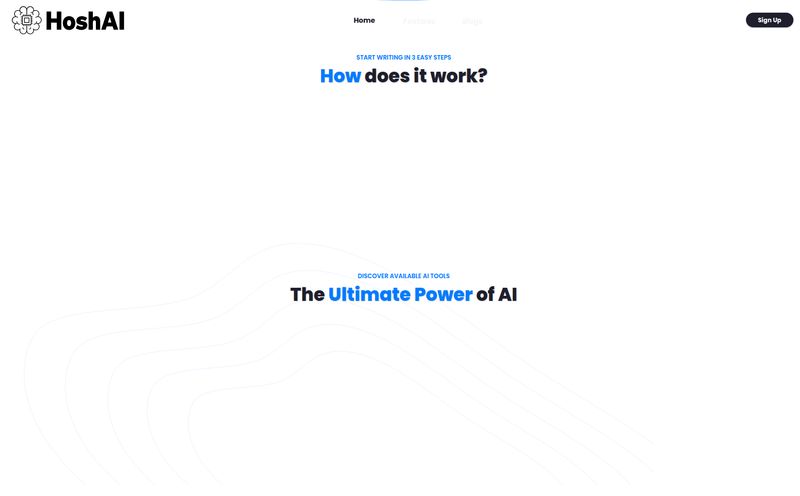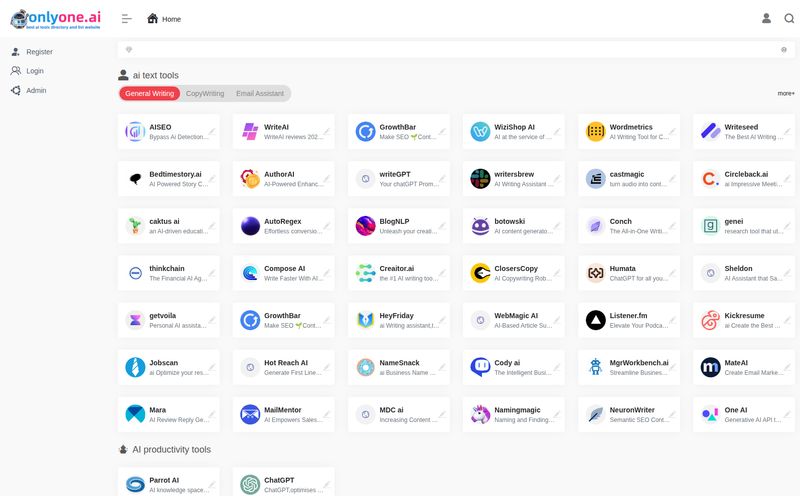In the world of SEO and digital creation, you're always on the hunt for the next cool thing. That new tool that'll save you time, spark an idea, or just let you do something ridiculously fun. So, when I heard about Weights.com—an AI platform promising a whole suite of free tools for creators—my ears perked up. We're talking AI voice covers, text-to-speech, image generation... the whole shebang. It sounded like a creator's sandbox, a place to experiment and play.
I was genuinely excited. I've seen the tidal wave of AI-generated content, from those viral videos of presidents playing Minecraft to rappers inexplicably covering Taylor Swift songs. The tech behind it, especially Retrieval-based Voice Conversion (RVC), is fascinating. And a platform that puts these tools in your hands for free? Sign me up. So I navigated over to the site, ready to make some beautiful, weird, or beautifully weird content.
And then… I hit a wall. A literal, digital wall. A big, fat “Sorry, you have been blocked” message from Cloudflare. Well, that’s not ideal.
So, What is Weights AI Supposed to Be?
Before we get into my access-denied saga, let’s talk about the promise of Weights AI. Based on everything I've gathered, it’s designed to be a community-centric hub for AI creation. Think of it as a blend between a powerful toolset and a social platform like GitHub or Thingiverse, but for AI models.

Visit Weights
The main attraction seems to be its focus on voice. The platform provides tools for creating AI voice covers, allowing you to take a vocal track and apply a different AI-trained voice to it. The community is the engine here; users can create, share, and use a massive library of RVC models. Want to hear Frank Sinatra sing a modern pop hit? If someone’s made the model, you can probably do it. It’s a wild and legally grey-ish frontier, but undeniably compelling.
The Features Behind the Curtain
Assuming you can get past the digital bouncer, Weights offers a pretty decent lineup of creative toys.
AI Voice Covers and the RVC Community
This is the star of the show. RVC technology allows you to clone a voice from audio samples and then use that model to convert other audio. The quality can be shockingly good, and the community aspect means there’s a constantly growing library of voices to experiment with. This is what's fueling a lot of the AI music trends on TikTok and YouTube. It’s a powerful tool for parody, art, and pure, unadulterated internet silliness. Of course, this also walks a tightrope over a canyon of copyright and ethical questions, but we’ll get to that.
Text-to-Speech, Image Generation, and More
Beyond the voice covers, Weights also packs in other useful AI functions. There's a text-to-speech (TTS) tool, which is always handy for content creators needing quick voiceovers. They also have an AI image generator, putting them in competition with the likes of Midjourney and DALL-E, albeit likely with less complexity. And, for a bit of fun, there's an AI character chat feature. These might not be the primary reasons you'd visit, but they round out the offering, making it more of a one-stop-shop for AI dabbling.
The Good, The Bad, and The Inaccessible
Every platform has its ups and downs. With Weights, the list of pros is tantalizing, but the cons—especially the one I ran into—are pretty significant.
The Potential Upside
The biggest pro is the 'free' tag attached to its tools. Lowering the barrier to entry for powerful AI tech is always a good thing in my book. It allows for more experimentation and creativity from people who can't afford expensive software subscriptions. The large, active community is another huge plus. A strong community means more models, more support, and more shared knowledge. Finally, the sheer variety of tools and the existence of a mobile app makes it an attractive package. It has all the ingredients for success.
The Glaring Downsides
Okay, let's start with the obvious: you might not even be able to use it. The Cloudflare block isn't a small issue. Is it a temporary server overload? A regional block? A measure to prevent bots from scraping their voice models? I don't know, and the page doesn't say. It’s a terrible first impression and a major roadblock (pun intended).
Digging deeper, even if you get in, there are potential bumps. The free version is reportedly limited, pushing you toward a premium plan. And the quality of the community-generated AI models will naturally vary. For every perfect voice clone, you'll likely find ten that sound like a robot gargling gravel. Then there's the biggest can of worms: the DMCA issues. Using famous people's voices without permission is, uh, legally dicey. Platforms like this are a minefield of potential takedown notices and lawsuits, as the music industry is still figuring out how to respond. It's something every user needs to be aware of.
What's the Price of Admission? The Weights Premium Plan
While Weights boasts free tools, it operates on a freemium model. To get the best stuff, you’ll need to open your wallet for Weights Premium. I couldn't find a clear pricing table (again, blocked!), but the proposition is straightforward: pay a subscription fee to get “exclusive access to Weights AI features” and, importantly, “support the community.”
This is a pretty standard model. The free tier gets you hooked, and the premium plan offers higher quality, faster processing, or access to the best models. I can't fault them for the business model, but the value of that subscription is completely dependent on whether the platform is stable, accessible, and delivering on its promises.
Final Thoughts: Is Weights AI Worth the Wait?
So, where does that leave us? Weights AI feels like a party that I was invited to, but when I showed up, the door was locked. The idea is brilliant—a democratized, community-driven platform for cutting-edge AI creation. The feature set is exactly what a modern creator or curious tinkerer is looking for.
But an idea is only as good as its execution. Right now, the execution seems shaky. The accessibility issue is a deal-breaker for me today, and the underlying legal questions about voice cloning cast a long shadow over the whole thing.
My advice? Keep Weights AI on your radar. It has the potential to be a really significant tool in the creator economy. But maybe don’t bet your next big project on it just yet. I’ll definitely be trying to access the site again in a few weeks. Hopefully, by then, they'll have rolled out the welcome mat instead of the block page.
Frequently Asked Questions About Weights AI
- What are RVC models?
- RVC stands for Retrieval-based Voice Conversion. It's a type of AI technology that learns the characteristics of a specific voice from audio samples. Once a model is 'trained' on that voice, it can be used to make other audio recordings sound like that voice. It's the tech behind most of the popular AI voice covers you see online.
- Why am I blocked from accessing weights.com?
- It's hard to say for certain. The Cloudflare block could be due to several reasons: heavy traffic overloading their servers, security measures to prevent data scraping, or it could be a regional block that prevents access from certain countries. It might also just be a temporary technical issue.
- Is using Weights AI for voice covers legal?
- This is a very murky legal area. Using a famous person's voice without their permission could potentially infringe on their right of publicity. Creating covers of copyrighted songs with AI voices adds another layer of copyright concerns. While it's a popular trend, it's not without legal risk, and you should proceed with caution, especially for commercial projects.
- How much does Weights AI cost?
- Weights AI offers a set of free tools, but it operates on a freemium model. For full access to all features and to support the platform, you can subscribe to Weights Premium. The exact cost of the subscription isn't readily available, but it is a recurring payment plan.
- What are some alternatives to Weights AI?
- If you're focused on voice cloning and TTS, there are several alternatives. For high-quality text-to-speech, platforms like ElevenLabs are very popular. For voice conversion, many creators use local installations of software like RVC or So-VITS-SVC, but this requires more technical skill. There isn't another platform that combines the community sharing aspect with the tools quite like Weights aims to.



